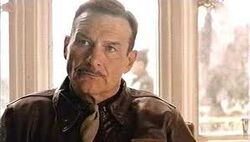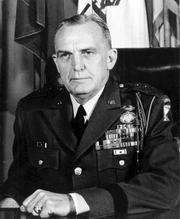| Robert F. Sink | |
|---|---|
 | |
|
Rank |
Colonel |
|
Actor |
Captain Dale Dye |
|
Status |
Deceased as of 1965 |
Colonel Robert F. Sink was the commander of the 506th Parachute Infantry Regiment, 101st Airborne Division, the elite unit in the U.S. Airborne.
Biography[]
Before WWII[]
Sink was born in 1905. He attended Duke university in 1923, before deciding to join the Army in 1924. He was appointed to the United States Military Academy, and graduated from West Point in 14 June 1927
He was assigned to the 9th Infantry Regiment at Fort Screven, Georgia, then assigned to the 65th Infantry Regiment. He took an assignment in Puerto Rico in 1929. Later, he was sent to the U.S. Army Chemical Warfare school at Fort Meade in 1932. He was then assigned to the 38th Infantry Regiment. In 1933, he was sent to the Civilian Conservation Corps at McAlveys Fort in Pennsylvania, where he was made a 1st Lieutenant on August 31. He then headed to the United States Army Infantry School at Fort Benning, Georgia in 1935.
Sink was then assigned to the 57th Infantry Regiment, Philippine Scouts at Fort McKinley in the Philippines in 1937, and was made a Captain on 13 June. In November, he returned to the States and was put in the 25th Infantry Regiment at Fort Huachuca, Arizona, and served as Company Commander, and Regimental Operations office.
In 1940, he was assigned to the 501st Parachute Infantry Regiment at Fort Benning, and qualified as a Parachutist. On 31 January 1941 he was promoted to Major and commanded the 503rd Parachute Infantry Battalion (which would later be a regiment), just before America entered WWII.
World War II[]
Robert Sink was promoted to Lieutenant Colonel on 1 February 1942 and was given command of the 506th Parachute Infantry Regiment in July, which was going to be a part of the 101st Airborne Division, at Camp Toccoa, Georgia, Fort Benning, and Fort Bragg.
In the series, Robert Sink was first seen congratulating 1st Lieutenant Herbert Sobel on making the finest company in the regiment, and promoted Sobel to Captain. He then told Sobel to make 2nd Lieutenant Winters 1st Lieutenant.
Sink was promoted to full Colonel on 3 November. After Toccoa, he read an article in a Life magazine about a Japanese Army battalion that had set a world record for marching 100 miles in seventy-two hours. "My men can do better than that!" he declared, and he chose 2nd Battalion to do the march. The Battalion marched 118 miles in 75 hours, all the way to Atlanta. 1st Lt. Walter Moore who commanded 3rd Platoon of Easy Company got past the finish line first with his men, and for that, his platoon led the parade in Atlanta.
Sink and his regiment went to Fort Benning, where they earned their jump wings. He gave a speech to the men of the 506th, telling them that he was proud of them, before receiving a drink from Sergeant Charles Grant and then yelling "Currahee".

The real Robert Sink
Later at Aldbourne England, a group of mutinous NCOs told Sink that they no longer wish to serve under Herbert Sobel. Sink became angry. "I ought to have you all shot! This is nothing less than an act of mutiny before the goddamn invasion of Europe!" He then transferred SSgt. Harris out of his regiment, and demoted Sgt. Ranney to Private, since they were the ringleaders. He told them that he was sparing their lives, since the invasion was coming. "Now get out of my sight. Get!" he ordered them. The incident did, however, give Sink cause to question Sobel's combat abilities. He questioned him about how the men were shaping up, because of the mutiny, and Sobel tried to assure Sink they were good men. Sink then told Sobel that he was transferring Sobel to Chilton Foliat, a Parachutist school for nonessential personnel. He told Sobel he was being replaced by Lieutenant Meehan and then dismissed Sobel.
Sink participated in Operation Overlord on 6 June 1944. His unit captured the town of Carentan on 12 June and held the town until 13 June. Sink recommended 1st Lt. Richard Winters for the Medal of Honor for his actions in the Brecourt Manor assault, but Winters instead received the Distinguished Service Cross, and the rest of the men earned Bronze and Silver Stars.
Sink jumped into Holland on 17 September as part of Operation Market Garden. His men captured most of their objectives, but Arnhem wasn't captured and the Operation failed on 20 September. His Regiment stayed to liberate the rest of the Netherlands. After continuous fighting, his Regiment was relieved on 26 November by the Canadian 1st Army.
On 18 December, Sink's regiment moved to the Ardennes Forest in Belgium to relieve the 28th Infantry Division during the Battle of the Bulge. Sink and his men were stationed at the town of Bastogne and held the town for weeks under constant attacks. During the battle, the German commander requested a surrender from Brigadier General McAuliffe, who was commanding the 101st Airborne at the time. Sink read out the General's reply to the men: "To the German Commander: 'NUTS!'", which made everyone laugh. On 26 December, General George S. Patton and his 3rd Army broke through the German lines, and cleared the way through Bastogne. Sink's men then headed out and later attacked the town of Foy on 9 January 1945. It was nearly disastrous: the commander of Easy Company, 1st Lt. Norman Dike, was shell-shocked and Captain Winters sent Capt. Ronald Speirs to relieve him. They eventually captured the town. After more fighting, the 17th Airborne relieved Sink and his men on 17 January and they then took a position at France in the town of Haguenau.
On 12 February, Sink tasked Captain Nixon to get prisoners for interrogation. He and Winters picked Easy Company for the patrol, and they successfully captured two prisoners, who were sent back to Regimental HQ. Sink was proud of this and called for another patrol, but Winters disobeyed because of bad weather conditions.
Sink's Regiment headed to Germany on 12 April to occupy the region. While at Landsberg, Easy Company discovered an abandoned Nazi concentration camp filled with starved Jews, Slavs, Gypsies, homosexuals, and other "undesirables".
After the liberation of most of Germany, Sink and his regiment moved to Austria, where he and a French commander competed to get to Hitler's "Eagles Nest". Sink eventually won the race, thanks to Easy Company blowing away a rockslide that blocked their path. On 8 May, Germany surrendered and the war ended in Europe. On 12 August, Sink was made assistant Division Commander. Later, Japan surrendered on 15 August and the Division was disbanded after that. It was said that Sink cried, for his Regiment was splitting up.
After the war[]
After the war, Sink assumed command of the infantry detachment of the United States Military Academy. On 11 April 1948, he was made Major General, and in August, Sink entered the National War College at Fort Lesley J. McNair, graduating in June 1949.
Sink was later sent to the Ryukyus command in October 1949, where he was made chief of staff. He then participated in the Korean War in 1950. He was made assistant division commander of the 7th Infantry Division in January 1951. During the war, he won 3 Silver Stars, 2 Legions of Merit, 2 Bronze Stars, and 2 Air Medals. In December 1951, he returned to America and became Assistant Division Commander of the 11th Airborne Division at Fort Campbell, Kentucky.
In February 1953, Sink was made Division Commander of the 7th Armored Division at Camp Roberts, California, followed by being made Division Commander of the 44th Infantry Division at Fort Lewis, Washington in December. He was later assigned to Fort Bragg, North Carolina, where he became part of the Joint Airborne Troop Board in October 1954. He was then sent to Rio De Janeiro, Brazil in 1955. In April, he assumed command of the dual functions of chairman of the United States Delegation and the Joint Brazil-United States Military Commission and the chief of army section of the Military Assistance Advisory Group in Brazil.
In May 1957, he returned to America and became commander of the XVIII Airborne Corps at Fort Bragg. In May 1958, he became commander of the Strategic Army Corps. On 8 September 1959, he was made Lieutenant General, and made commander of the American forces in Panama. After that, he retired in 1961.
Sink died in 1965.